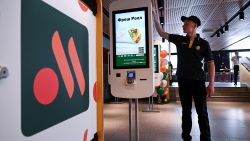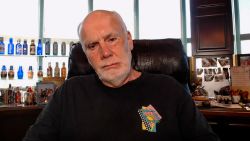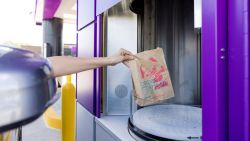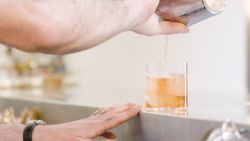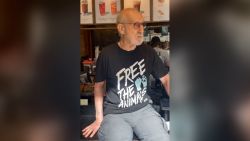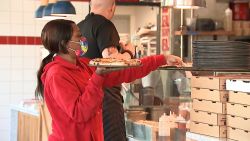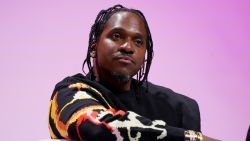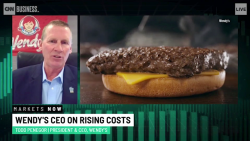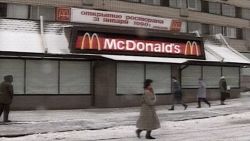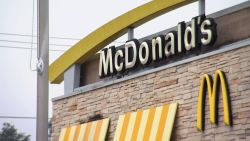Starbucks is leaning into tech with its new concept store.
Essentially, it’s a mashup of a regular Starbucks pickup store and an Amazon Go store, where customers grab items without having to wait in line to pay. No freebies though — you’ll be charged when you exit. And you’ll still have to pay for barista-made drinks in the store. The New York City location opens on Thursday.
Here’s how it works: Customers who just want a Starbucks item to-go can order online and pick it up at a counter, or order from a barista just as they would at a regular location.
But customers who want to come in and spend time in the Amazon Go market, which has booth seating as well as individual desks, countertops and tables where you can have a quick bite, have to follow Amazon’s process.
That means using either a credit card, Amazon app or your palm to gain access to the seating area, which has heated, refrigerated and regular shelves full of food, snacks and beverages. There are also typical Starbucks snacks and meals, like sous vide egg bites, croissants and protein platters. And there are Amazon Go sandwiches and salads, plus local offerings, which include bagels from Ess-A-Bagel and treats from Dominique Ansel, among other options.

Once you’re inside, Amazon (AMZN) uses cameras to keep tabs on which items you’ve taken, and charges you accordingly. The system doesn’t apply to Starbucks drinks made by baristas, however — for those you’ll have to pay through the app or at the Starbucks counter.
Starbucks (SBUX) plans to open only three stores like this over the next year — another one in New York City, and a third in a yet-to-be-determined spot. The future of the concept after that is unclear. But stores like this are in keeping with Starbucks (SBUX)’ plan to increase its “convenience-led formats.”
For Starbucks, the hybrid shop is yet another re-imagining of its third-place concept, which bills its stores as the place to go after home and work. It’s also a way to reach customers obsessed with convenience and speed whose routines may be different as they emerge from the pandemic.

What the third place looks like in 2021
Starbucks has long pitched itself as a so-called third place where you can sip a cappuccino, read the paper, listen to a carefully curated playlist of smooth jazz and, increasingly in 2021, work remotely.
“There’s space to plug in, space to be, space to connect, space to have meetings,” said Kathryn Young, Starbucks senior vice president of global growth and development.
It’s also a way to “meet customers where [they] are at different places all throughout the day.”
During the pandemic, when corporate employees stopped going into offices, Starbucks customers began shifting their behaviors — picking up coffee later in the day, perhaps after having their first cup at home. Recently, mornings have picked up again, noted John Culver, chief operating officer and group president of North America at Starbucks, during an October analyst call.

Sales have also grown as people resume their normal routines. But Culver noted that “recovery has been slower” in central business districts. With some companies embracing hybrid models, where people spend less time working at the office, a location with more lunch and snack options could draw in customers who no longer stop for coffee every morning.
The chain is able to roll out more locations that rely on mobile orders as people flock to its app-based loyalty program. In the quarter ending on October 3, the number of 90-day active members of the Starbucks Rewards loyalty program jumped 28% compared to the same period last year, reaching 24.8 million people. The company started letting customers use credit cards, Apple Pay, Google Pay or cash through the app in the fall, making it more attractive for people who had avoided the app because it didn’t allow those payment options.
It remains to be seen whether customers will feel comfortable with the Amazon Go concept, which may feel intrusive to those not comfortable with Amazon surveilling their purchases. Young is not worried that the format will turn people off, she said.
“Our customers are telling us that they’re excited about the convenience that Amazon brings,” she said. For those who are not so keen on Amazon Go, “we have options,” she noted. “If you just want to pop in, [and] pop out, you’re welcome to do that.”




